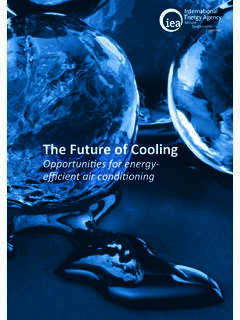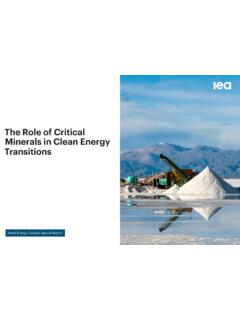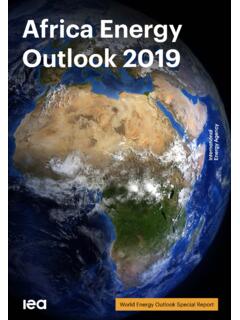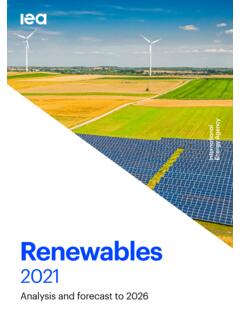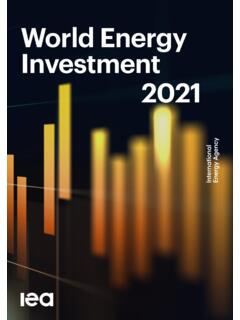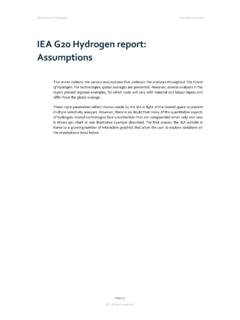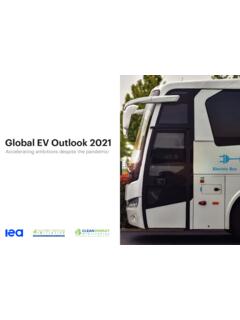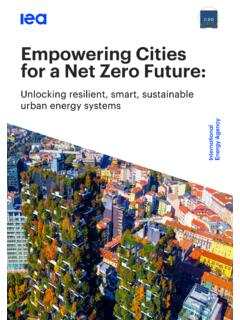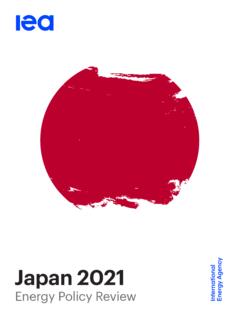Transcription of The Future of Petrochemicals - .NET Framework
1 The Future of PetrochemicalsTowards more sustainable plastics and fertilisersTogetherSecureSustainableThe Future of PetrochemicalsTowards more sustainable plastics and fertilisersIEA member countries: Australia Austria Belgium CanadaCzech RepublicDenmarkEstoniaFinland FranceGermanyGreeceHungaryIreland ItalyJapanKoreaLuxembourgMexicoNetherlan dsNew Zealand NorwayPolandPortugalSlovak RepublicSpainSwedenSwitzerlandTurkeyUnit ed KingdomUnited StatesThe European Commission also participates in the work of the IEA. OECD/IEA, 2018 international Energy Agency Website: note that this publication is subject to specific restrictions that limit its use and distribution.
2 The terms and conditions are available online at ENERGY AGENCYThe IEA examines the full spectrum of energy issues including oil, gas and coal supply and demand, renewable energy technologies, electricity markets, energy efficiency, access to energy, demand side management and much more. Through its work, the IEA advocates policies that will enhance the reliability, affordability and sustainability of energy in its 30 member countries, 7 association countries and four main areas of IEA focus are: n Energy Security: Promoting diversity, efficiency, flexibility and reliability for all fuels and energy sources;n Economic Development: Supporting free markets to foster economic growth and eliminate energy poverty.
3 N Environmental Awareness: Analysing policy options to offset the impact of energy production and use on the environment, especially for tackling climate change and air pollution; andn Engagement Worldwide: Working closely with association and partner countries, especially major emerging economies, to find solutions to shared energy and environmental OECD/IEA 2018 The Future of Petrochemicals Towards more sustainable plastics and fertilisers Page | 3 Foreword We live in a world dependent on Petrochemicals . From the cars we drive to the food on our plates, the products and materials we derive from Petrochemicals are fundamental to many aspects of modern society.
4 Plastics and fertilisers, the two largest groups of chemical sector products, are indispensable in our everyday lives. Plastics is the fastest-growing group of bulk materials in the world, and synthetic nitrogen fertilisers underpin nearly half the world s food production. The manufacture of Petrochemicals and their derivatives absorbs an increasing proportion of the world s oil and gas approximately 14% (13 million barrels per day [mb/d]) for oil and 8% (300 billion cubic metres [bcm]) for gas. Because much of this energy enters the Petrochemicals sector as feedstock and does not undergo combustion, the sector achieves the seemingly contradictory feat of being both the largest industrial energy consumer and yet only the third-largest industrial carbon dioxide (CO2) emitter.
5 Even so, with the market for petrochemical products set to expand further as the global economy develops, the Future of the Petrochemicals industry is of major significance for both global energy security and the environment. This international Energy Agency (IEA) analysis explains the circumstances of the Petrochemicals industry today and projects how it might develop to 2050. Using the IEA Reference Technology Scenario, the projections are first made based on established trends. Then, a path to a sustainable Future is drawn for the industry, one consistent with the UN Sustainable Development Goals the Clean Technology Scenario.
6 The trajectory of the chemical sector in the Reference Technology Scenario implies a rate of growth in oil demand that is higher than that of any other sector. Of the nearly 10 mb/d growth in total oil demand projected for 2030, the chemical sector is on course to account for more than a third. The sector also plays a significant role in the total growth in gas demand, where it accounts for 7% of the roughly 850 bcm global increase by 2030. Because of this robust growth in fossil fuel consumption, direct CO2 emissions from the sector increase by around 20% by 2030 and 30% by 2050.
7 Similar deleterious rises occur in air pollutants and water demand. Perhaps most alarmingly, without drastic improvements in the management of waste stemming from the sector s key material output plastics the quantity of plastic waste, including that entering the oceans, continues to rise from today s already unacceptable levels. An alternative Future for Petrochemicals one in which plastics and fertilisers, in particular, are produced more sustainably is entirely feasible. In this pathway, traced in the Clean Technology Scenario, the petrochemical industry makes the necessary contributions to realising the UN goals.
8 Our analysis concludes by identifying two priority areas for those committed to carrying out this vital transition, along with specific actions to be taken in each. This is the third book in an IEA series concentrating on what I refer to as blind spots in global energy: major areas of energy demand that deserve a greater level of attention from policy makers. Previous studies in the series have focused on energy use in air-conditioning and trucks. There will be more. Dr. Fatih Birol Executive Director international Energy Agency The Future of Petrochemicals OECD/IEA 2018 Towards more sustainable plastics and fertilisers Page | 4 Acknowledgements This report was prepared by the Directorate of Sustainability, Technology and Outlooks under the direction of David Turk, in co-operation with other directorates and offices of the Agency.
9 The lead authors and co-o rdinators of this report were Araceli Fernandez Pales and Peter Levi. Key contributors and supporting authors were Simon Bennett, Jason Elliott, Tae-Yoon Kim, Kristine Petrosyan, Joe Ritchie, Aad van Bohemen, Tiffany Vass, Molly A. Walton and Kira West. The report benefited from valuable inputs and comments from other experts within the IEA, including Christophe Barret, Adam Baylin-Stern, Laura Cozzi, Rebecca Gaghen, Asbj rn Hegelund, Tim Gould, Timur G l, C dric Philibert, Cecilia Tam and Laszlo Varro. Robert Priddle carried editorial responsibility and Caren Brown was the copy-editor.
10 The IEA Communication and Information Office assisted and contributed to the production of the final report and website materials, particularly Astrid Dumond, Christopher Gully, Jad Mouawad, Bertrand Sadin and Therese Walsh. Diana Browne provided essential support to the peer review process. Several experts from outside the IEA were consulted during the model development, commented on the underlying analytical work and reviewed the report. Their contributions were of great value. Those experts include: Alice Hussak Van Velthem Ramos (Petrobras), Luis Adolfo Pereira Beckstein (Petrobras), Patricia Carneiro dos Santos (Petrobras), Suzana Helena Tintner (Petrobras), Jonathan Cullen (University of Cambridge), Seth Roberts (DOW chemical , The international council of chemical Associations [ICCA]), Ed Rightor (DOW chemical , The international council of chemical Associations [ICCA]), Florian Ausfelder (Gesellschaft f r Chemische Technik und Biotechnologie [DECHEMA])
